I have been using language elearning apps since Duolingo came out several years ago. During that time, I’ve seen the seen them evolve in appearance and user experience. As much as I like using an attractive and easy to navigate app, as a learner, what I want is a solid pedagogical approach that gets me results.
In this post, I’ll review Rocket French which is an app I came across a few months ago having tried almost every other French elearning app and website with little success.
Rocket Languages provide course for English, Spanish, French and several other languages and what struck me first when visiting their site was how professional the courses looked but without the heavy sell that some other companies use. From trying out and then enrolling on their French course, I can honestly say that the people behind RF seem to really care about their product. They answer emails, they send you useful personalised ‘Rocket Fuel’ emails with language to help you, a summary of your progress and tips from a real person, not just some automated system. The personal touch shines through the course too via the 2 presenters of the MP3 that kicks off every lesson and the recordings of useful language that you learn and are tested in. this continues until the final roleplay simulation where you choose to play the male or female role and really speak in real time.
The majority of other apps that I’ve tried have really lacked in the speaking and writing areas. The developers seem to be unable to work out how to teach and improve speaking skills apart from the odd voice recognition word repetition exercise like in Duolingo and Babbel. They also lack writing as it’s so difficult to assess apart from spelling words. But it’s these 2 skills that I need and that for me, help me learn. Reading page after page of grammar or listening and repeating words does not engage my brain or my love of languages. I’m very happy to say that RF tackles speaking and writing and so you learn using all 4 skills. It has the standard voice recognition app that Duolingo and Babbel use but it seems to be better at recognising correction use and is certainly used more often and effectively in RF.
The dashboard of RF is pretty full. It’s definitely not as simple as some others but that’s good because you get far more than just a list of lessons to run through. For instance, there’s a ‘my notes’ section that collects all the post-lesson notes you make. The ‘my vocab’ section lists all the words and phrases you chose to save from your lessons. Combined, these 2 tools help you engage with the content and revise what you feel is most useful. The next tab is titled ‘ideas’ and as they put it, there are “handy tools, tips and techniques designed to help you master your Rocket Language course”. These take the course far beyond the now too common app-designed elearning where the ‘ease of use’ means only having minimal content.
You have 3 levels, starting from Premium level 1 to level 2 then Platinum. Each one has 4 sections: Interactive audio lessons (8 modules), language and culture lessons (8 modules), survival kit (9 lessons) and flashcards. Each of the main modules contains 4-5 lessons while the language and cultures modules have up to 10. This means there are 34 audio lessons at this level and 60 language and culture ones. This is quite a lot and when you consider that just the intro podcast from every audio lesson is about 15 minutes long before you even start doing any exercises, you really feel you are getting your money’s worth.
Each lesson is organised like this:
- Podcast to contextualise the content and introduce the key phrases.
- Listening to key phrases.
- Conversation transcript chunks to listen to and record to test your pronunciation.
- Extra vocabulary as above.
- A test of ‘hear it, say it.’
- Another test of ‘write it’.
- A test called ‘know it’ to measure your understanding.
- A multiple choice quiz.
- An interactive roleplay simulation called ‘play it’.
You don’t have to follow each step though. In many apps, you have to go through each single stage and that can become annoying.
As you can see, there is a LOT of content here. It’s all audio-based and functional with titles like ‘in a shop’ and ‘booking a room’ so people like me who learn from listening and speaking will benefit a lot. I also really like the writing tests but the best part are the roleplays. You can choose to be the man or woman and choose your level of difficulty so you progress from a very supported version where you listen to the other speaker and respond by reading from the screen to the ‘on your own’ level where you listen and respond.
You might have noticed the lack of typical grammar lessons. Well, they are included but in a much better are more integrated way than most courses do. Like before, they are more personal and you almost feel like you’re being coached. Whereas another app may have a lesson or a section that says ‘future’ tense followed by extensive grammar rules, RF has ‘going back in time’ and nice little extracts like:
“With English, we rarely stop to think about exactly how a past action took place: was it a habitual action or was it a one-off? In French, these questions are important factors when learning to use the past tense.”
It is these parts that shine through the whole course from the initial viewing of the site to the daily emails. The people behind RF really seem student-focussed and it’s motivating. You are not just another user on their database.
Here is another nice example from the same lesson:
“As you begin this Lesson, be aware that you are taking another major step forward in expanding the scope of your conversation skills. Using the past tense in French means that you will find more examples where literal translations do not apply. You will have to adapt to learning verb formations that don’t always make sense in your own native language!”
The course I was using before simply gave a full screen of rules and example sentences then 3-5 multiple choice questions to answer. Often some of the questions involved exceptions which were not covered in the lesson or only mentioned a tiny bit. The RF grammar lesson is not brief, it gets intense but guides you slowly by the hand and gives you all the important examples to listen to, read and record. I then add the important ones to ‘my vocab’ for later use. As with the audio lessons, the grammar have the 3 tests at the end but also nice approachable and interesting cultural parts that are directed towards foreigners. These bits are the kinds of things a French friend might tell you. For instance:
“French workers are famous for going on strike; unfortunately, that includes public transportation. In case of a strike, most buses and tramways will stop running, and only 1 in 3 trains (if not worse) will function. You can either wait; but your patience will surely be tested; or walk, take a cab, or rent a car.”
I’ve been using RF or a few months when I have time and really like it. For me, it just feels more like home as it is a real course with levels and progression but you don’t have to go step-by-step. You can skip parts if you want but just make sure you know enough to pass the unit tests. As with many other apps, it’s gamified in the sense that you get points and targets and the emails are nice reminders from a friend to do another lesson. If I was more dedicated, I would stick to my daily goals but for the first time in a long time, I actually want to use this app and feel like I’ve learned by the end of a lesson. It is the first time I have worked on my writing and I speak a lot in each lesson and have to work on my accent. Yes, there are no ‘real’ writing sections like writing emails and reports but being able to write key phrases, words and tenses is right for me now and is still far better than the majority of competitors. This perhaps is the problem with the industry in that many other apps have adopted the random lesson and content approach and so if you are expecting a really heavy course with reading, discussion and essay writing, you will disappointed. So I would say that RF is very good at working on speaking via listening and adds on functional grammar.
I will continue studying with RF to improve my speaking in useful situations and to work on my basic writing. It takes you from A1 to maybe C1 which is exactly what I need now and I’m sure is also what other people may need too. As you might have gathered, based on my previous experience of French elearning, I like RF. It’s everything the others are not. Even just based on its own attributes, it is a good audio-based course that really helps you learn, is easy to use and makes you want to do more. I’d definitely recommend it to other people but I’d also suggest finding a language partner to practise the dialogues with and to extend them and then someone to help you with real writing like emails. You should also start reading longer texts. I believe that this is the best approach for me and people like me.
You can try out Rocket French or one of the many other languages such as Spanish or English at: https://www.rocketlanguages.com/
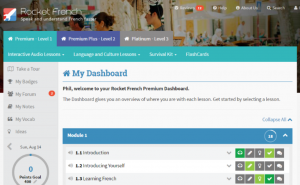
This is the RF dashboard or the main page for your course. It’s very clear and easy to use. Everything is reachable in 1 click.
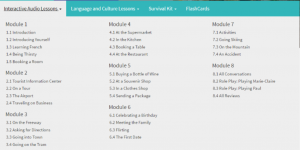
Here are the modules for the first level. They are all topics that I need as a French learner in France.
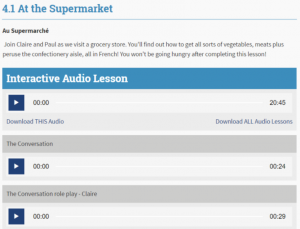 ,
,
This is the start of a typical lesson. You can listen to the mp3 discussion, download it or just skip it all together.
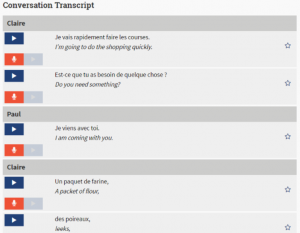
RF takes out the key phrases from the mp3 and in this section you can read, listen and record them to check your pronunciation. I then click on the star if I want to add them to my records for later.
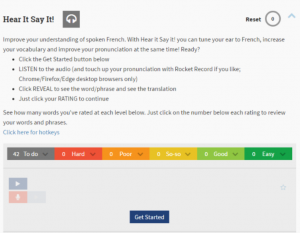
This is an example of the main types of tests or activities where you listen and record yourself and the app rates you performance.
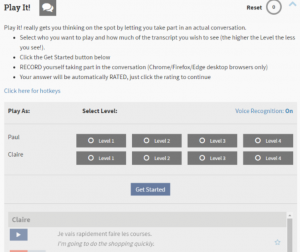
I mentioned how good the roleplays are so here is what they look like. As you can see, you can select the role and level.
Review by Phil Wade.
Phil is a university English teacher, a Business English coach and also creates elearning and helps companies with marketing strategies. He has a BA (hons) in Marketing, a PGCE with an EAL specialism, the MA TESOL, the CELTA and DELTA. He has a Cambridge certificate in Executive Coaching, the ILM 5 Coaching and Mentoring certificate, was an accredited IELTS examiner and a Cert iBET Business English tutor. He is currently doing a PhD in course enhancement and evaluation.